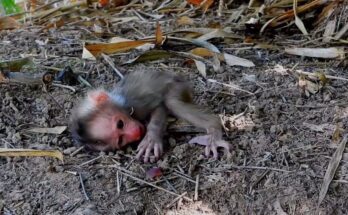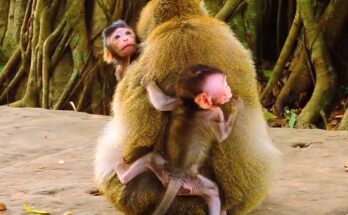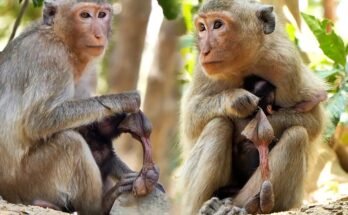The Angkor Wat forest carries a magic unlike anywhere else in the world. Morning light filters gently through towering stone temples, and the air hums with ancient whispers. It was here, under the sacred shade of crumbling carvings, that I witnessed one of the most tender moments between a young mother monkey named JUTA and her fragile baby.
The scene began quietly. The baby clung to JUTA’s chest, eyes wide, uncertain of the world that sprawled before him. His tiny fingers fumbled against her fur, trembling not only with weakness but also with the weight of first experiences. Around them, moss-covered roots twisted like protective arms, while the chorus of cicadas played in the distance.
And then it happened.
JUTA bent her head, so close her lips nearly brushed the baby’s ear, and she whispered—soft, soothing, almost like a lullaby only he could hear. Her voice wasn’t human, of course, but her intention was unmistakable: she was motivating, encouraging, telling her little one that he was safe and strong enough to take his next step.
The baby shifted, loosening his grip just enough to wobble onto the temple’s stone edge. His legs trembled. For a moment, he nearly collapsed, but JUTA’s hand—gentle yet firm—slid behind him like a promise. She steadied him, and with a patient glance, she urged him to try again.
I couldn’t look away. There was something universal in that moment—something every parent, whether in the U.S. or Cambodia, could recognize. The love in her eyes spoke louder than any words. She wasn’t simply teaching her child to stand; she was teaching him courage.
When he faltered again, JUTA didn’t scold or turn cold. Instead, she pressed her forehead against his tiny head and gave another whisper, a mother’s encouragement written not in language but in love.

As I watched, I thought of mothers back home—cheering their toddlers on as they stumble across living rooms, holding bicycle seats steady in suburban driveways, whispering late-night reassurances through bedroom doors. JUTA’s moment, though set in the wild heart of Angkor, reflected the same timeless devotion.
It wasn’t about survival alone. It was about building a spirit strong enough to face life’s storms. Every whisper, every steady hand was a message of love and resilience—one that transcends borders, species, even centuries.
The Angkor forest seemed to respond. A breeze stirred, carrying the scent of wet earth and flowering vines. Sunlight slipped through the canopy, illuminating mother and child as if the ancient stones themselves wanted to bear witness to this sacred exchange.
The baby finally managed a few shaky steps, his little feet pattering against the stone. JUTA didn’t let go completely, but she allowed him the space to try. And when he succeeded—even for a moment—her eyes lit up with pride, her arms gathering him back into the safest embrace he would ever know.
I felt my own heart swell. This wasn’t just nature. It was a story—a living reminder of what binds us all. Love, whispered softly, is sometimes the most powerful force in the world.
As I left the temple clearing, I carried the image of JUTA and her baby with me. Their bond, so fragile yet unbreakable, reminded me that motherhood—no matter where it blooms—remains one of the most beautiful and universal expressions of love.
Even now, I can almost hear her whisper echoing through the Angkor forest. It’s a soundless promise, carried not just to her child, but to anyone willing to pause and listen: “You are loved. You are strong. You are never alone.”


